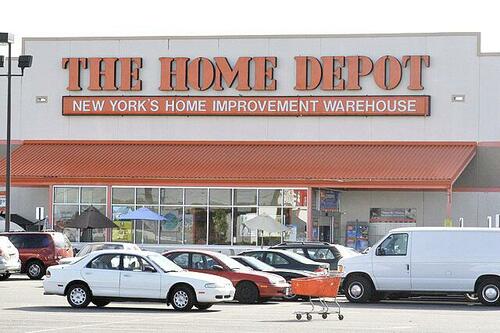Entrepreneurialism Isn't A Choice, It's A State Of Mind: The Genius Of Bernie Marcus

Entrepreneurialism Isn't A Choice, It's A State Of Mind: The Genius Of Bernie Marcus
Authored by John Tamny via RealClearMarkets,
“Get out of the car! Get the f**k out of my car.” That’s a paraphrase of the words of the recently passed, and incomparably GREAT Bernie Marcus. Marcus, along with Arthur Blank and Ken Langone, co-founded The Home Depot.
The individual Marcus ordered out of his car was a venture capitalist, and more crucially for Marcus and his colleagues, a venture capitalist who had agreed to invest $3 million in The Home Depot. As Marcus recalled in Built From Scratch, the 1999 business memoir he co-authored with Blank, “we needed that $3 million the way somebody dying of stab wounds needs blood in his veins.”
Yet the principled Marcus still wouldn’t take a cent from the investor precisely because the investor insulted Marcus and the team he’d put together with all sorts of demands. They would have to give up health insurance, and accept even less pay than the low pay they’d already accepted in return for risky employment at a business that was more a concept than a business.
Marcus’s actions from long ago raise an obvious question: With money extraordinarily tight for a concept that had attracted no interest from blue-chip investment banks (they went with the wonderful Ken Langone and his “no-name investment bank”), why didn’t Marcus accept the terms (any terms) necessary to keep things afloat?
The answer is that entrepreneurialism isn’t a choice, it’s a state of mind. It’s a powerful belief in a different way of not just meeting, but leading the needs of customers that’s so deeply ingrained that it’s near impossible to compromise one’s vision. Marcus’s vision wouldn’t be insulted by this nit-picking investor, only for Marcus and colleagues to have the last laugh. By the late 1990s, the $3 million would have been worth $12 billion.
About the gains the VC missed out on, they’re a happy story, but also realistically a distraction. The much bigger story is just how profoundly the market’s view of The Home Depot had changed. In the staggering return that the unnamed VC missed out on, it’s easier to see just how at odds the vision of Marcus, Blank and Langone was relative to conventional wisdom. As Marcus himself explained it, “no one believed we could do it.” The latter is regularly said by people from all walks of life, and is often said in self-serving fashion.
Marcus was speaking the truth, though in surely understated fashion. See the VC’s would-have-been returns yet again. No one passes up an investment like that unless the consensus is that they most certainly can’t do it. Yet Marcus et al did do it.
Better yet, they did it in decent fashion. About the bankers who helped finance and liquefy the eventual growth of The Home Depot, Marcus wrote that “they put their careers on the line for us, and we protect them.” So true. Banks make loans that need to be paid back, which means bankers that make errant loans won’t long be in the employ of banks.
Customers were treated even better than bankers. They had to be handled with care, and more important, they were never to be sold what they didn’t need. Instead, they would be treated beautifully by The Home Depot’s expert associates on the assumption that if catered to, eventually they’d rely on The Home Depot for the big purchases required to execute big projects in the home.
Crucially, the cost of buying for big projects was very low. Marcus understood as the greats of business do that real wealth is created not via so-called “pricing power” and the margins that come with it, but through prices that are pushed down as much as possible in concert with shrinking margins. Marcus knew that low prices provided to customers would be made up for in much higher sales volume. He was correct.
Evidence supporting the previous claim can be found in the continued rise of Home Depot’s market cap. Notable about the latter is that the aforementioned VC’s missed investment opportunity of the $12 billion variety was calculated by Marcus in 1999 numbers. Stop and imagine what it would be now with The Home Depot valued at roughly $400 billion.
Which further speaks to the endless decency of Marcus. He recognized that “real money is equity,” and lived up to his aphorism. He developed an employee stock ownership plan that created thousands of millionaire associates at The Home Depot. More evidence of his greatness. His genius will be missed, but not forgotten.
John Tamny is editor of RealClearMarkets, President of the Parkview Institute, a senior fellow at the Market Institute, and a senior economic adviser to Applied Finance Advisors (www.appliedfinance.com). His latest book, released on April 16, 2024 and co-authored with Jack Ryan, is Bringing Adam Smith Into the American Home: A Case Against Homeownership.


